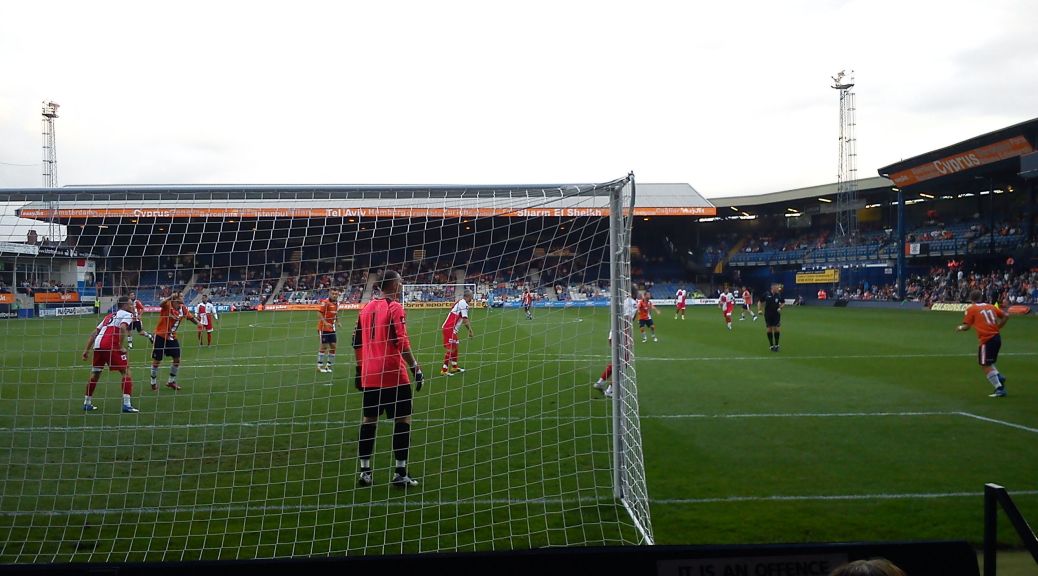In 1890, Luton Town Football Club became the first team in the south of England to pay its players, heralding the dawn of professionalism and the end of the age of the Victorian footballing gentleman amateurs.
124 years later, following last season’s promotion from the Conference; the Hatters have become the first Football League club to agree to pay its entire workforce the Living Wage.
A statement on the club’s website read: “This applies to all contracted members of staff in all departments including football, retail, catering, maintenance and administration. The change to staff pay will be absorbed by the club and there will be no increases in ticket or retail prices as a result.”
A day after the Hatters’ announcement, Chelsea, backed by billionaire Roman Abramovich, said it would follow the lead of the Kenilworth Road side in voluntarily raising the hourly rate of pay for all of its workers.

Chelsea chairman Bruce Buck said: “We believe the move to the living wage underlines our commitment to ensuring that all our employees receive a fair rate of pay for their hard work and dedication. Quite simply, it is the right thing to do.”
Mayor of London Boris Johnson said Chelsea were “setting the right example” with the move and added: “They realise their team is more than just the 11 men out on the pitch, and that by putting more pounds in the pockets of their staff they are signing up to a win-win scenario that rewards a hard day’s work with a fair day’s pay for everyone.”
The Living Wage is an hourly rate set independently and updated annually, calculated according to the basic cost of living in the UK. Businesses are under no obligation to pay the Living Wage, though the benefits to companies who choose to sign up to the code include a reduction in absenteeism and a perceived improvement in quality of work and relations between staff and employers. The current UK Living Wage, as set by the Living Wage Foundation, is £7.85 an hour nationally and £9.15 in London compared to the current minimum wage for over 21s of £6.50 per hour.
Chelsea and Luton Town have followed Scottish Championship side Heart of Midlothian and non-league FC United of Manchester, themselves founded in 2005 as a community club in protest against the takeover of Manchester United by the Glazer family; in signing up to pay the voluntary wage.
The Living Wage has received cross party support, with public backing from Prime Minister David Cameron and Labour leader, Ed Miliband.
Labour MP for Tottenham, David Lammy, who has campaigned for all of London’s Premier League clubs to follow the lead tweeted: “League 2 club (Luton) with 1 of the smallest budgets becomes 1st of Eng’s 92 pro clubs to commit to Living Wage. Puts bigger clubs to shame.”

Luton Town’s recent past has sadly been impacted by financial mismanagement and controversy. Having graced England’s top division for 10 years during the 1980s and early 1990s, the Hatters’ fall from the top has been as much a result of off-the-field matters as anything to have taken place on the pitch. Three successive relegations from the Championship to the Conference, hastened by administration and points deductions saw fans, players and staff suffer for the mistakes of previous regimes.
Through their off-field lead on the Living Wage and in chasing promotion to League One, Luton Town are back in the headlines for the right reasons. Whether other clubs follow the gesture remains to be seen. With many lower league clubs finding themselves close to the wall, it is erroneous to imagine that all clubs can afford to volunteer to pay their employees more than the minimum wage.
Whilst football and footballers can reflect, and in many cases influence society, the sport itself cannot be expected to lead the charge for fairer pay alone.
With a small number of clubs now leading by example and raising awareness for the Living Wage, more employers and staff may stand to benefit in the long-term.


Good article Kieran B-)